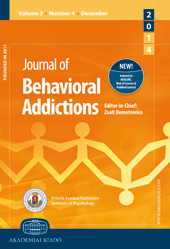Self-concept clarity and compulsive Internet use: The role of preference for virtual interactions and employment status in British and North-American samples
Self-concept clarity and compulsive Internet use: The role of preference for virtual interactions and employment status in British and North-American samples
Author(s): Cristina Quinones, Nada Korak KakabadseSubject(s): Social psychology and group interaction, Psychology of Self, Behaviorism, Substance abuse and addiction, Social Informatics, Human Resources in Economy
Published by: Akadémiai Kiadó
Keywords: self-concept clarity; compulsive Internet use; preference for virtual interaction; unemployment; life satisfaction; social support;
Summary/Abstract: Compulsive Internet Use (CIU) describes a maladaptive relationship with the Internet characterised by loss of control and conflict. Although also affecting adults, most studies use teenage samples, and theoretical development on risk factors is scarce. According to Davis (2001), the social connectivity function of the Internet is key in identifying traits associated with CIU. Since Self-Concept Clarity (SCC) is strongly related to social anxiety, and virtual interactions allow “self-edition”, we hypothesized that individuals low in SCC could choose virtual interactions as safer alternative to satisfy their social needs. This could in turn increase the risk of CIU. Building on a previous study, we also expected CIU to be more harmful in the unemployed. Methods: We collected samples from the UK (N = 532) and US (N = 502) with equal distribution of employed and unemployed individuals. We ran Measurement Invariance tests to confirm that the constructs were equivalent across countries. Subsequently, we conducted mediation and moderation analysis to test our hypothesis with Multigroup Confirmatory Factor Analysis. Results: Measurement Invariance was confirmed. The relationship between SCC and CIU was partially mediated by preference of virtual interactions in both countries. This preference was significantly related to lower social support. Short term unemployment seemed to accentuate the negative impact of CIU on life satisfaction in both countries, although only marginally significantly in the US. The unemployed reported significantly lower levels of life satisfaction. Conclusion: We demonstrated that SCC is a key vulnerability factor to CIU in adults, and confirmed the additional risks for the unemployed.
Journal: Journal of Behavioral Addictions
- Issue Year: 4/2015
- Issue No: 4
- Page Range: 289-298
- Page Count: 10
- Language: English

